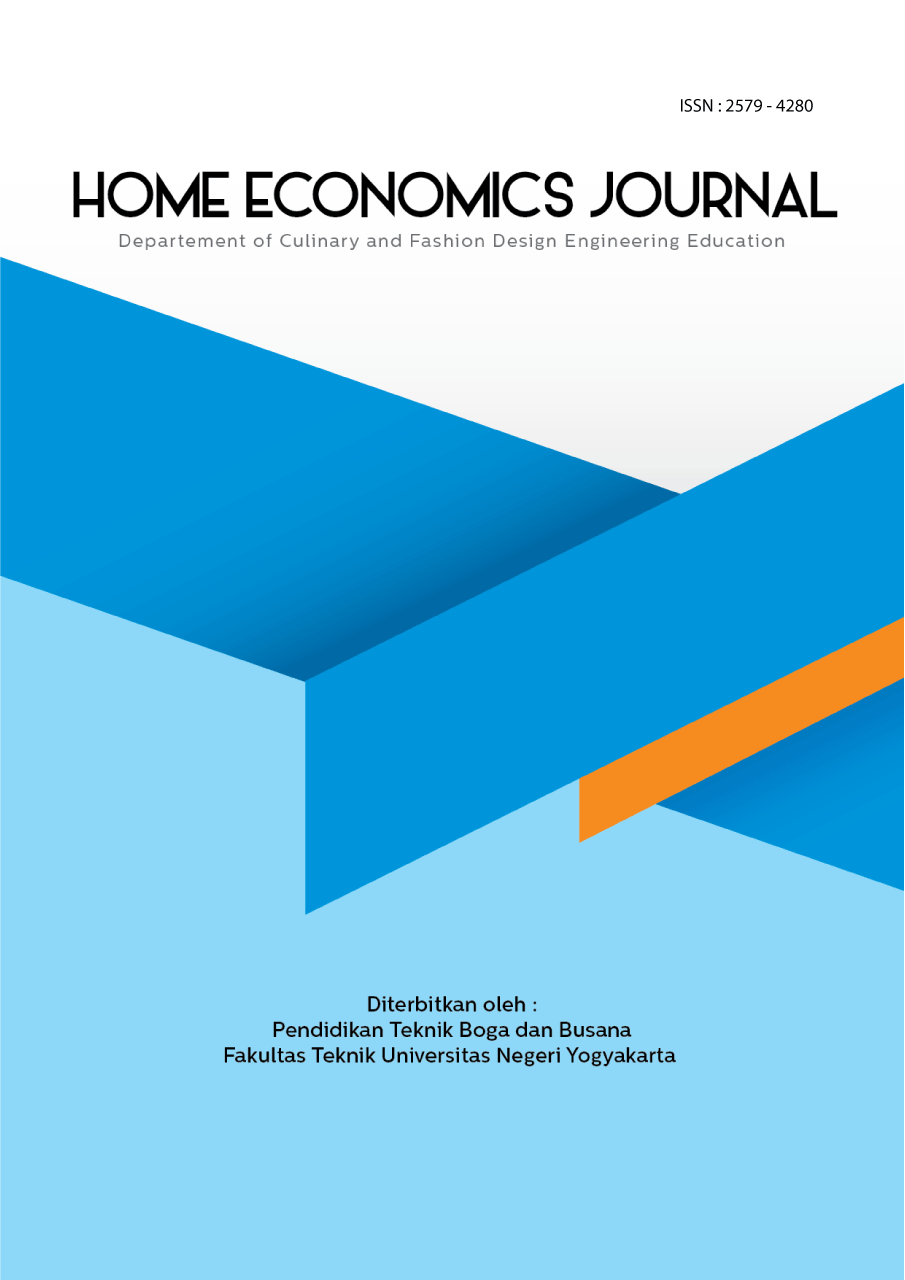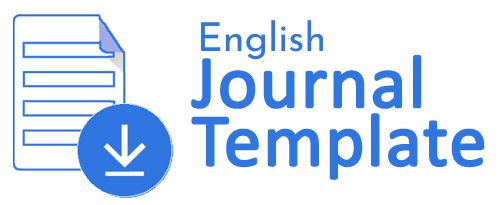INCREASING KNOWLEDGE OF FISH PROCESSING THROUGH TRAINING ON MAKING FISH-BASED CULINARY PRODUCTS
DOI:
https://doi.org/10.21831/hej.v9i2.88971Keywords:
Fish-Based Culinary Products, Fish Consumption Patterns, Fish Processing Knowledge, TrainingAbstract
This research aims to determine the level of knowledge about fish processing among women entrepreneurs before receiving training on fish-based culinary product making, describe the implementation of the training, measure the level of knowledge after the training, and identify changes in knowledge among women entrepreneurs in Sardonoharjo Village, Ngaglik, Sleman. This study employs a quantitative descriptive approach with a one-group pretest–posttest quasi-experimental design. The population consists of women who are culinary MSME entrepreneurs in Sardonoharjo Village, and all 118 participants were selected using a total sampling method. The research instrument was a 31-item knowledge test that had been previously validated and tested for reliability. Data were analysed using descriptive statistics, the N-gain test, and the paired sample t-test. The findings indicate that the participants’ knowledge of fish processing before the training was at a moderate level, with an average pretest score of 10.38, and the lowest performance was observed in the C3 and conceptual domains. The training was delivered through a lecture method combining theoretical material about fish with practical processing activities. After the training, the participants’ knowledge remained in the moderate category. Still, it improved substantially, with an average post-test score of 22.71, and the most significant increase occurred in the C2 and conceptual domains. Overall, there was a significant improvement in knowledge, reflected by an N-gain score of 0.63, indicating a moderate level of effectiveness of the fish-based culinary training program.
References
[1] (WFP) World Food Programme, “Global Hunger Crisis,” WHO. [Online]. Available: https://www.wfp.org/global-hunger-crisis
[2] B. Bappeda DIY, “Tingkat Konsumsi Ikan,” Pemprov DI Yogyakarta.
[3] L. J. Damongilala, Kandungan Gizi Pangan Ikani. Bandung: CV. Patra Media Grafindo, 2021.
[4] A. E. Tifanny, A. K. Mudzakir, and B. A. Wibowo, “Analisis Tingkat Konsumsi Ikan Laut Dan Faktor-Faktor Yang Mempengaruhi Pada Masyarakat Semarang,” Journal of Fisheries Resources Utilization Management and Technology, vol. 9, no. 1, pp. 25–34, 2020.
[5] H. Munarko et al., “Pola Konsumsi Produk Hasil Perikanan Oleh Masyarakat Kabupaten Lamongan [Consumption Pattern of Fishery Products by Lamongan Regency Communities],” Jurnal Pengolahan Perikanan Tropis, vol. 1, no. 01, p. 15, Sep. 2023, doi: 10.58300/planet.v1i01.474.
[6] U. Priyadi, “Pelatihan Pengolahan Ikan Menjadi Makanan Siap Konsumsi Di Desa Argodadi, Sedayu, BantuL, D.I.Y.,” Sleman, 2018. [Online]. Available: https://dspace.uii.ac.id/handle/123456789/11482
[7] A. A. Subakir, M. Hubeis, and W. Trilaksani, “Strategi Peningkatan Konsumsi Ikan pada Masyarakat Berpendapatan Rendah Di Provinsi Jawa Tengah,” MANAJEMEN IKM: Jurnal Manajemen Pengembangan Industri Kecil Menengah, vol. 15, no. 1, pp. 70–76, Jan. 2021, doi: 10.29244/mikm.15.1.70-76.
[8] W. S. Purnomo, “Komunitas Informasi Masyarakat Sardonoharjo Raih Predikat Terbaik Nasional,” Radio Republik Indonesia (RRI).
[9] S. A. Lestari, “Penerapan RPP dalam Pelatihan Nonformal untuk Meningkatkan Kompetensi Masyarakat,” Jurnal Pendidikan Nonformal, vol. 15, no. 2, pp. 67–75, 2020.
[10] M. N. Arsyad and T. Ifianti, “Pelatihan Membuat Media Pembelajaran Berbasis Powerpoint Bagi Guru – Guru Madrasah Ibtidaiyah,” Jurnal PkM Pengabdian kepada Masyarakat, vol. 4, no. 6, p. 585, 2022, doi: 10.30998/jurnalpkm.v4i6.6822.
[11] D. Arifah and K. Nur, “Strategi Efektif Membimbing Diskusi Kelompok Kecil Untuk Meningkatkan Kolaborasi Siswa STAIN Mandailing Natal , Indonesia diskusi kelompok kecil . Pertama , penggunaan pertanyaan terbuka dapat merangsang pemikiran,” Harmoni Pendidikan : Jurnal Ilmu Pendidikan, vol. 2, no. 1, pp. 213–220, 2025.
[12] D. Sari, “Learning by Doing Sebagai Strategi Pembelajaran pada UMKM Perempuan,” Jurnal Pendidikan dan Pemberdayaan, vol. 7, no. 4, pp. 87–96, 2021.
[13] A. Miyanto, “Pengaruh Teknologi Informasi, Inovasi dan Pelatihan terhadap Kinerja UMKM Berbasis Pengolahan Ikan di Kota Banjarmasin,” Jurnal Ilmiah Ekonomi Bisnis, vol. 26, no. 1, pp. 55–63, 2021.
[14] V. Y. Erviana, W. M. Rahayu, and F. N. Mahmudah, “Pelatihan Pengolahan Ikan pada Ibu Rumah Tangga di KWT Sedyo Rahayu,” Seminar Nasional Hasil Pengabdian kepada Masyarakat, 2021.
[15] H. Pratama, “Peran Partisipasi Peserta dalam Efektivitas Pelatihan Berbasis Komunitas,” Jurnal Komunitas, vol. 8, no. 1, pp. 22–29, 2021.
[16] R. McCormick, “Conceptual and Procedural Knowledge,” Int J Technol Des Educ, vol. 7, no. 1–2, pp. 141–159, Jan. 1997, doi: 10.1023/A:1008819912213.
[17] R. Khairina, E. Normelani, and N. Nasrudin, “Pendampingan dan Pelatihan Pengolahan Abon dan Kerupuk Ikan Bagi UMKM di Desa Pinang Habang Kabupaten Hulu Sungai Utara,” JATI EMAS (Jurnal Aplikasi Teknik dan Pengabdian Masyarakat), vol. 3, no. 1, p. 80, Mar. 2019, doi: 10.36339/je.v3i1.191.
[18] Femyliati Rahmanita, Fikri Al Mukhlas, and Andriani Eka, “Pengaruh Edukasi Gizi Melalui Media Sosial Terhadap Pengetahuan Gizi dan Pemilihan Menu di Aplikasi Pesan Antar Makanan,” Amerta Nutrition, vol. 7, no. 2, pp. 248–254, 2023, doi: 10.20473/amnt.v7i2.2023.24.
[19] P. F. A. Dewi, I. G. A. A. Widarti, and D. P. Sukraniti, “Pengetahuan Ibu Tentang Ikan Dan Pola Konsumsi Ikan Pada Balita Di Desa Kedonganan Kabupaten Badung,” Jurnal Ilmu Gizi : Journal of Nutrition Science, vol. 7, no. 1, 2018, doi: https://doi.org/10.33992/jig.v7i1.213.
[20] Z. Arifin, Evaluasi Pembelajaran. Bandung: Remaja Rosdakarya, 2009.
[21] R. Prabowo, “Pembelajaran Berbasis Praktik untuk Peningkatan Keterampilan UMKM,” Jurnal Pendidikan dan Pelatihan, vol. 19, no. 3, pp. 66–77, 2021.
[22] B. Kusnadi, “Peningkatan Pengetahuan dan Keterampilan Melalui Pelatihan UMKM Perikanan,” Jurnal Pengembangan UMKM, vol. 10, no. 1, pp. 22–34, 2019.
Downloads
Published
How to Cite
Issue
Section
Citation Check
License
Copyright (c) 2025 Elfina Agung Aisyahra, Nani Ratnaningsih

This work is licensed under a Creative Commons Attribution-ShareAlike 4.0 International License.









